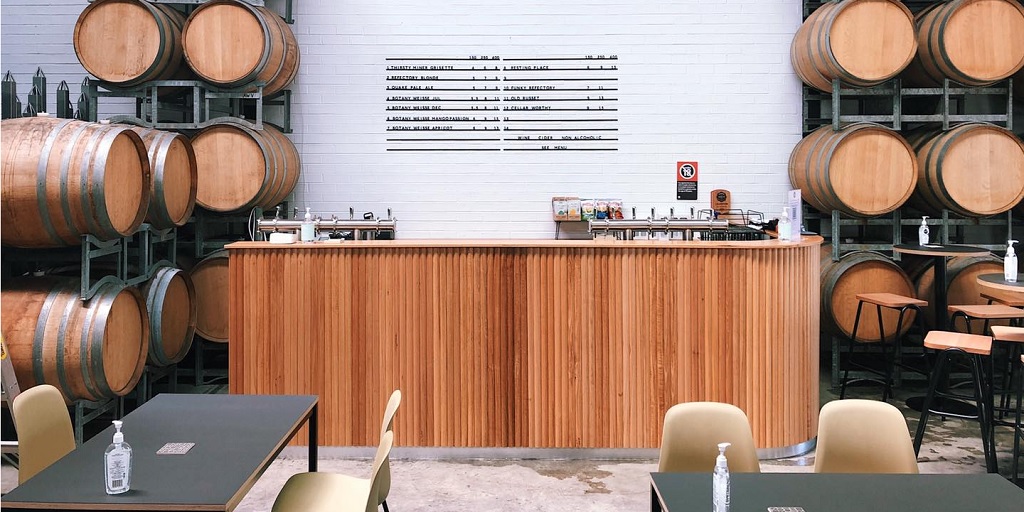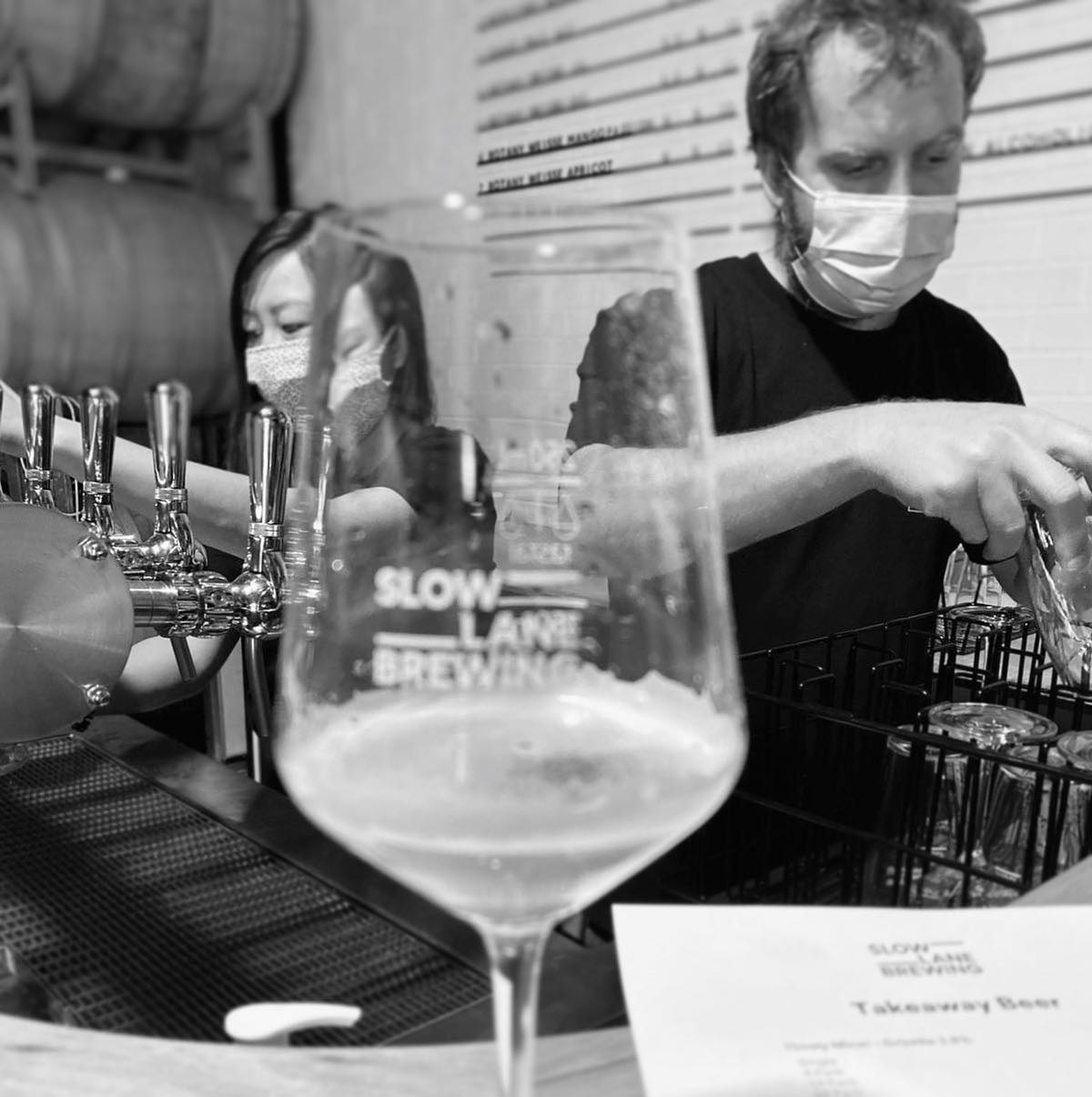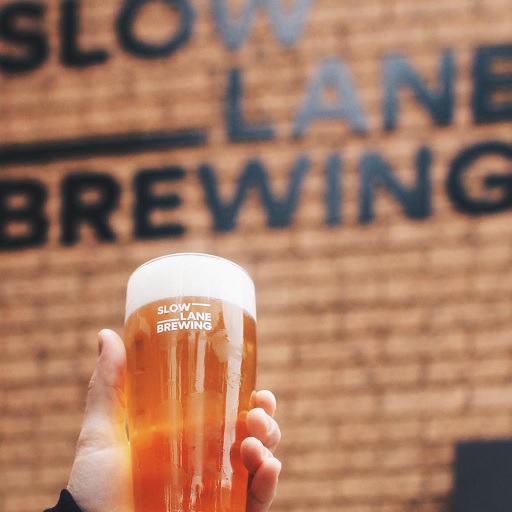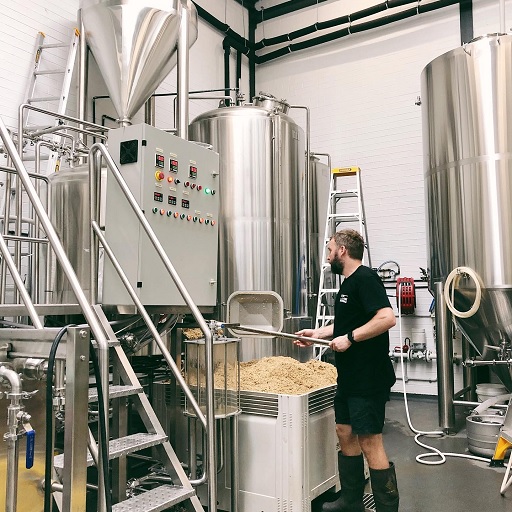
Slow Lane Brewing launches in Botany

After commencing brewing operations last year, Slow Lane Brewing opened its doors to customers last weekend in the Sydney suburb of Botany.
The minimalist taproom and brewery features Slow Lane’s modern interpretations of European-style beers, emphasising slow and mixed ferments, natural carbonation and barrel aging.
But it’s been a long journey for co-founders Alex and Yvonne Jarman, having put the self-funded taproom on hold during COVID to focus on brewing and distribution.
The couple were living in the US and working corporate jobs when the seed of the idea to build a brewery was planted.
“I’ve always been into beer. Living in Australia before moving to the US I was getting into various styles of beer, imported beers, European beers, and always trying different things,” explained Alex.
“Then we both moved to New York for corporate jobs. Being in the US we were exposed to the craft beer scene and I got more and more into it.”
In 2013 Yvonne gifted Alex a homebrew kit from Brooklyn Brewery.
“And that started his homebrew obsession,” she said.
“There was only one time I did regret it – he had upgraded his kit and we’d gone away over the long weekend. The beer started producing a lot of water and bubbles, more than we’d expected, and it seeped downstairs. Our landlord was really angry. I was like, ‘what have I started?’
“But it’s cool that what started as a present because he liked beer actually fuelled his passion, and has become basically our lives!”
A move to the West Coast with Yvonne’s job prompted Alex to take the plunge and gain experience at commercial breweries in California.
But it was not until their return to Australia following the birth of their son that the Jarman’s dreams of owning their own brewery became reality.
Planting the seeds
Arriving back to Australia, finding a venue for the venture was first priority.
“We didn’t appreciate how long it would take to find the right spot and a landlord who’s willing to let you start a brewery, because there are quite a few things you do to the property,” explained Yvonne.
Alex said that they were specifically looking for an industrial space, rather than attempting a city centre, suburban brewery or heritage build, which comes with its own issues.
“That’s the kind of breweries we liked in the US, the ones in industrial spaces which operated as a proper working brewery and on weekends they would convert into a tasting room space.”
The Jarmans signed the lease on their site at 30 Byrnes Street more than two years ago, but it took another six months for the development application to come through and longer to bring in the equipment – a 12hL Tiantai brewkit on which they have been brewing before launching their taproom.
“Getting the equipment took a while, but we were lucky because this was before COVID, I don’t know how hard it would be if we’d ordered it during the pandemic,” said Yvonne.
Slow Lane has been brewing its slow-fermented beers and started to distribute prior to opening the taproom.
“Both the tasting room and wholesale distribution will be big parts of the business, but there will be a cap on how big we can grow it,” explained Alex.
“I think the tasting room is very important, yes it brings money in the door but it also helps having that space that people can see and taste your beers.
“A lot of people that had been following our progress and were interested in coming to the bar. We’ve been open for takeaways but there are lots of new people that were following us for ages and couldn’t wait for us to open because they wanted that bar experience.”
COVID
Like many breweries in planning they were somewhat protected during the COVID-19 pandemic, with no staff and no loss of income from an open venue.
“The beers we make – and the name Slow Lane refers to this – most of them take a couple of months or a year or longer, not weeks,” Alex explained.
“We wanted to brew and get beers underway and be ready for when the tasting room opens but soon after, COVID hit.
“The tasting room wasn’t near ready, there was a lot of work to do, so instead of the tasting room we focused on filling barrels, brewing beers, getting our name out there and getting into cans.
“Putting the taproom plans on hold meant we did more things ourselves too.”
It was, in some ways, not a terrible time for the pandemic to hit. During the lockdowns Slow Lane offered takeaway beer from the brewery and sold to a number of bottle shops in its local area.
“COVID has been hard for everyone and it definitely slowed our initial plans for getting everything ready, but at the same time we were lucky we hadn’t made some of those critical decisions like opening a tasting room or hiring people so we could pivot quickly, and it’s lucky people still want to drink!” said Yvonne.
The industry
Making your way in any industry as a startup can be difficult, but launching during a period of growth when people are questioning the saturation of the market can be even more challenging.
“A part of it is just trying to do something different,” explained Alex when asked what sets Slow Lane apart.
“There are a lot of breweries out there and a lot of breweries doing a lot of similar types of beer.
“We wanted to add some more diversity to the scene in Australia. [The beers Slow Lane brews] are the beers I like to drink, old-world European styles, mixed fermentation, sour beers.
“The other thing is we didn’t think there was any point trying to make beer the same way or same type as large breweries – we were never going to be as efficient as them, it’s not our goal.
“We’re still not that efficient in the grand scheme of things, but I would rather focus on doing things the way we want them, because minor differences in the processes can create very different beers.”
Whether Australia’s market is oversaturated though is another matter.
“If you compare us to the US, we’re not [that oversaturated]. There are areas where it might be saturated but there is always room for more breweries if you do something differently and can capture that market, and each small brewery is really only a fraction of a per cent of the beer market.”
Yvonne explained that Slow Lane believed that there was potential for growth in the customer base of craft beer too.
“In the US a lot of our friends and a lot more women drink beer and there’s more variety. If you went to the bar you would try new interesting beers and not necessarily stick with wine or champagne.
“Coming back home I feel that amongst my friends especially the women, there’s an association of beers with their dads, so I’m hoping that the overall interest and the people who are interested in beer will grow as well, and create a bigger market.”
While Slow Lane may be doing things differently to the breweries churning out limited releases and experimenting with less traditional ingredients and styles, Alex said that everyone had their place in the industry.
“Beer drinkers go through different cycles. I got into those crazy beers and then moved more into more traditional styles again like well-made traditional lagers.
“People go on journeys with what they drink,” he said.
Slow Lane Brewing is now open to customers at 30 Byrnes Street on Fridays and Saturdays.
Brews News has followed the progress of Slow Lane Brewing on its bimonthly Bintani Brewery Radar, which details the progress of breweries in planning across Australia.
Brewery openings are presented by Spark Breweries and Distilleries, the finest in-venue and production brewing systems available, with local design and support.






